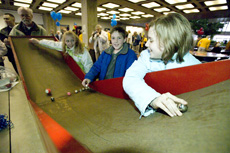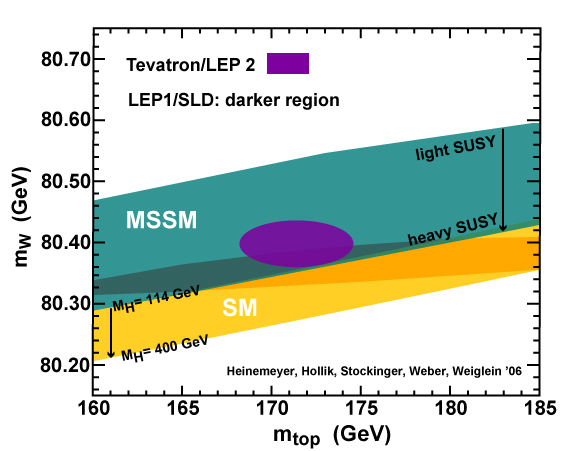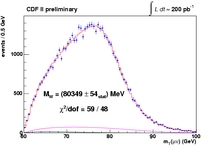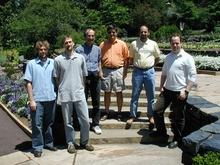|
Thurs., January 18
10:00 a.m. ILC Detector Test Beam Workshop (day-long events, Jan. 17-19)
2:30 p.m.
Theoretical Physics Seminar -
Curia II
Speaker: R. Mahbubani, Fermilab
Title: Probing New Physics in Final States with Top Pairs and Missing Energy
3:30 p.m. Director's Coffee Break - 2nd Floor Crossover
THERE WILL BE NO ALCPG ILC PHYSICS AND DETECTOR SEMINAR THIS WEEK
THERE WILL BE NO ACCELERATOR PHYSICS AND TECHNOLOGY SEMINAR TODAY
Fri., January 19
12:30 p.m.
Particle Astrophysics Seminar -
The Dark Side (WH-6W) (NOTE TIME, DATE and LOCATION)
Speaker: A. Dall'Aglio, Astrophysikalisches Institut Potsdam
Title: The Proximity Effect in High Redshift QSOs, Observations
and Simulations
3:30 p.m. Director's Coffee Break - 2nd floor crossover
4:00 p.m. Joint Experimental Theoretical Physics Seminar -
1 West
Speaker: D. Karlen, University of Victoria
Title: ILC Detector R&D Overview
8:00 p.m. Fermilab Lecture Series - Dr. Neil Shubin, University of Chicago,
The First Steps on Land - Auditorium
Click here for NALCAL,
a weekly calendar with links to additional information. |
Thursday, January 18
-Cream of Wild Mushroom
-Blackened Fish Filet Sandwich
-Southern Fried Chicken
-Tuna Casserole
-Eggplant Parmesan Panini
-Assorted Slice Pizza
-Assorted Sub Sandwich
Wilson Hall Cafe Menu |
|
Thursday, January 18
Dinner
Steamed Mussels in White Wine and Thyme
Marinated Leg of Lamb
Ratatouille
Pear and Cranberry Strudel
Wednesday, January 24
Lunch
Grilled Salmon Fillet with Scallion Sauce
Winter Vegetable Medley
Mocha Profiteroles
Chez Leon Menu
Call x4598 to make your reservation. |
|
|
Fermilab offers Family Open House Sunday, February 11

The Family Open House offers hands-on activities and projects for children and adults.
This year's Family Open House at Fermilab will take place on Sunday, February 11, from 1:00 to 5:00 p.m. Organized by the Fermilab Education Office, the event offers free family-style hands-on activities and exhibits, make-and-take projects, science shows and tours. More than 2,000 people are expected to attend. Registration is required.
The highlights of this year's program will include the demonstration of historic experiments originally conducted during the 18th century by Benjamin Franklin and other scientists; the popular Ask-a-Scientist session on the 15th floor of Wilson Hall; and tours of the linear accelerator. Plans for tours to additional sites are now being finalized.
"We will offer new hands-on experiments with light, electricity and magnetism," said Spencer Pasero, an education specialist at Fermilab. "And of course we'll have old favorites such as the gravity accelerator and Mr. Freeze's cryogenics show."
The event is free of charge but advance registration is required. All ages are welcome, but the open house is most appropriate for children in grade 3 and up. (Tours are restricted to ages 10 and up.) Contact Nancy Lanning at edreg@fnal.gov or 630-840-5588 for more information.
--Kurt Riesselmann
|
Thank you, Mr. Dixon
Dear FT:
Roger Dixon's message was clear, concise and to the point
in yesterday's issue of Fermilab Today. He summed up the emotional state a lot of us
are feeling throughout the lab right now.
I totally agree with his message about staying focused. His words were encouraging and a great pep talk for all of us.
--Curtis Danner, PPD
|
The First Steps on Land lecture, Friday, January 19
Don't miss Dr. Neil Shubin at Fermilab this Friday, when he will talk about surprising developments in the evolution of land animals. Shubin startled the world in March, 2006, with his announcement in the journal Science of the discovery of Tiktaalik, "a mosaic of primitive fish and derived amphibian." This 375-million-year-old fossil was found in the Arctic region of Canada, and according to Shubin, opens "a remarkable window on one of the major events of the history of life on Earth."
Tickets are available for $5; just call 630-840-ARTS (630-840-2787), or fax to (630) 840-5501. An answering machine will take your confidential message during times that the box office manager is not available.
Find more details about Dr. Shubin's lecture in the January 17 edition of the Kane County Chronicle.
|
Submit abstracts for computing conference
Fermilab will host the 15th annual IEEE NPSS Real Time
Computing Conference in April, and the advisory committee is currently accepting abstracts from potential speakers. The deadline to submit an abstract is January 26.
The
committee is considering abstracts dealing with real-time computing, such as data acquisition triggering, event building and online processing farms.
Program Chair Margaret Votava says conference participants tend to be engineers, computer specialists and scientists, and the mood is intimate. "Because it's a smaller conference, you have a lot of opportunity to meet and talk to your counter parts from other labs," said Votava. You can find more information about submitting an abstract here.
|
Nature News,
January 18, 2007:
Behind the hunt for the Higgs boson
Race to find elusive particle steps up a gear
Tension is building on both sides of the Atlantic in the race to find the Higgs boson, the elusive particle predicted by physicists' understanding of mass.
Scientists working at the Tevatron particle collider at Fermilab in Batavia, Illinois, welcomed the new year by measuring the mass of another subatomic particle, the W boson. This finding lowers the expected mass of the Higgs, bringing it further into the range in which the Tevatron might be able to find it.
Meanwhile, the Tevatron's more powerful competitor, the Large Hadron Collider (LHC), is entering its final stages of construction at CERN, the European particle-physics lab near Geneva in Switzerland. If the Higgs exists, the LHC should find it, but the spark of a chance that the Tevatron might get there first is energizing both teams. "We are pulling out all the stops," says Mark Lancaster, one of around 700 scientists working on the Collider Detector at Fermilab (CDF) - an instrument that collects and analyses debris from proton-antiproton collisions in the Tevatron.
Read More |
|
|
The W weighs in again

The allowed range of Higgs mass in the Standard Model corresponds to a band in the mW versus mtop plane. *See below for a more detailed description.
The mass of the W boson is fundamental in the Standard Model of
particle physics. Its value is dependent on large corrections from
the top quark and the Higgs boson. Therefore, if you know the top
mass and the W mass with great precision, you can calculate what the
Higgs mass should be. If the Higgs mass turns out to be different from
this prediction, or if no Higgs is found with this mass, this would be
a clear indication of physics beyond the Standard Model.
Using the first 200 pb-1 of data, CDF has produced its
first W mass result of Run II. Not only is this a vast improvement from what
it previously measured, it is now the most precise single experiment
measurement in the world. Since the W's used in this analysis decay
to leptons, the measurement requires a detailed understanding of both
muons and electrons produced in CDF. With improvements in the
calibration of the new tracking chamber and a more detailed fast
simulation of energy deposited in the calorimeters, CDF has been able
to improve upon their measurement techniques.
The resulting W mass measurement, 80413 ± 48 MeV/c², is a
0.06 percent measurement. When this new measurement is included in the
theoretical calculations, the overall Standard Model constraint on the
Higgs mass narrows to 80 +36 -26 GeV/c², a range which is well
covered by direct Higgs searches at the Tevatron.
CDF expects to collect almost 15 times the amount of data used in this
analysis by this summer's shutdown. Since most of the uncertainties
scale down with more statistics, the W mass measurement will improve
substantially. Now, with this new information indicating an
even lighter Higgs boson, enthusiasm grows at CDF and DZero because
they might be able to find it. Of course, it is always possible that
nature has some even richer scenario than a simple Standard Model
Higgs to discover!
Learn more
*Graphic at top of page: The allowed range of Higgs mass in the Standard Model corresponds to a band in the mW versus mtop plane. The purple is from direct measurements of the top quark and W boson masses, the yellow is from predictions of top and W mass, orange is from predictions using other precision observables, and green is from a Supersymmetric (SUSY) theory called MSSM which is a possible extension of the Standard Model. SUSY scenarios predict a band higher in W mass.

Above: Transverse W mass for the muon sample. Background contributions are also shown. The overall result uses lepton energy, and missing energy as well as transverse mass for both muons and electrons. Below: W mass analysis group. From left, Ian Vollrath (Toronto), Chris Hays (Duke/Oxford), Larry Nodulman (Argonne), William Trischuk (Toronto), Ashutosh Kotwal (Duke) and Oliver Stelzer-Chilton (Toronto/Oxford). Vollrath and Stelzer-Chilton wrote PhD theses on this analysis.

|
|
Metra survey
Metra has extended the deadline for employees and neighbors to participate in a survey about the proposed STAR Line railroad along the east side of Fermilab. Almost 200 Fermilab employees and users have participated so far. Other people can still take the survey until Friday, January 26. Please read this article for more information and a link to the survey.
Free Digital Certificates Training
The Office for Professional and Organization Development is offering digital certificate training at no charge. Digital certificates are commonly used at Fermilab and the broader open science community. When shopping online, the underlying technology that allows a transaction to remain secure is based on the use of digital certificates. Fermilab is now offering a beginning level course that will provide a background on certificates, then give specific instructions on how to install certificates in your browser, including the two most popular certificates at Fermilab: KCAs and DOEGrids. Internet Explorer, the Netscape family, and Safari will be addressed. You will have the opportunity to create your own digital certificate in the new hands-on portion of this class. Classes are scheduled for Jan. 19th, Feb. 15th, and March 12th. To enroll in one of the sessions please visit the enrollment website.
Upcoming Activities
|
|